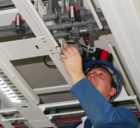Plastics get stamp of approval

Des Dolan discusses how plastics are now becoming more accepted by the building-services industry for piped services.
Despite being around for over 50 years, plastic pipework systems are still viewed as a new ‘modern’ material by many — with lots of users of traditional metal systems not convinced of their pedigree. However, this year has seen a huge breakthrough in the use of plastic pipework, as SummitSkills, the sector skills council for building-services engineering, has given the material its backing for use in training and education.
This recognition by an influential industry association is good news for plastic pipework manufacturers, including Durapipe, which has spearheaded the initiative to train the next generation of building services engineers in plastic pipework.
Traditionally, young people training to be mechanical engineers and plumbers have only been trained in copper and steel pipework systems, but this is no longer meeting the skills demanded of today’s employers. As a result, Durapipe has been campaigning for plastics to be included within training modules at colleges and universities. This has resulted in SummitSkills including a plastics module within the SkillPIPE competition this year, acknowledging the importance it places on young people possessing the skills of working with this material.
In addition to training young people entering the industry, there is also a job to be done with educating those already working in the industry on the benefits of plastics. Contractors, consultants and specifiers that have always worked with metal products often find it difficult to consider more innovative materials.
Metal pipework is traditionally the primary choice for conveying water in modern buildings, but it is not the only option; plastic pipework systems can provide equal, if not higher, performance levels compared with metal systems.
The benefits of plastics over metals during installation are significant, especially on solvent cement jointed systems. The simple one-step jointing procedure means that joints are made quickly and easily, reducing labour time and cost. In addition, at around one sixth the weight of metal products, plastic systems are much easier to handle on site. Further, no hot works or specialist tools are required, so installation time can be significantly reduced.
The impressive savings in installed cost are not the only advantages of plastics; long-term performance benefits mean that the pipework system lifespan will contribute to significant life-cycle cost savings. Plastic materials do not suffer from limescale build-up; the smooth bore of the pipe remains the same throughout its lifetime, maintaining consistent flow rates and improved efficiency. The corrosion resistance of plastic also mean that there will be no material deterioration in soft water areas, avoiding costly maintenance and repair work.

There is a common misconception within the industry that plastic is plastic. The reality is that there is a range of different plastic materials with different performance characteristics. The variety of plastic materials available ensures that there is a solution to meet all building-services pipework needs.
Durapipe’s SuperFLO ABS, for example, is an extremely robust pipe system that remains tough and durable at temperatures as low as -40°C, making it ideal for chilled or boosted cold water applications. Vulcathene is a purpose-designed chemical drainage system, offering safe chemical waste conveyance for a variety of laboratory applications in schools, hospitals, universities and research facilities. The Friatherm hot and cold water system boasts a wide operational temperature range from 0 to 90°C and coupled with speed of installation, it is a cost effective alternative to copper. Friaphon is a purpose-designed sound-reducing drainage system that offers outstanding sound-insulation properties, compared with traditional cast iron or lagged single-wall plastic drainage, making it ideal for multi-occupancy developments.
There will always be a need for metal pipework systems because of the current legal requirement for gas and also to meet particular high-pressure requirements of certain applications. However, for building-services needs, plastic solutions meet and exceed performance requirements, as well as offering additional benefits.
There has been a definite shift in pipework specifications within the building-services industry over recent years, with more and more contractors being converted to the benefits of plastic systems. By continuing to educate those already working in the industry and combining this with the training of young people entering the industry, the use of plastic pipework systems can only increase.
With SummitSkills backing plastic pipework systems for use in training the next generation of building-services engineers, it begs the question of why more contractors and specifiers are not embracing the material.
Des Dolan is building-services brand manager for Durapipe UK.








